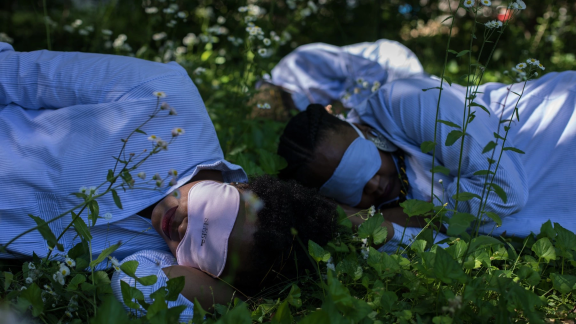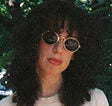Aesthetically-pleasing slogans proffering self-care are a dime a dozen these days. We know that self-care is a radical act. Whether we know what self-care actually looks like, or understand just how interconnected it is with the history of the Black protest and community organizing movements, is another thing.
While we might find the idea of doing sheet mask or getting manicures a palatable form of self-care, it’s hardly unproductive. And to find moments of unproductivity is kinda the point. But if being deliberately unproductive is the height of political acts in a culture like ours, naps are the very pinnacle. Just ask Tricia Hersey.
As the founder of The Nap Ministry, the Chicago-born Hersey’s work positions rest as resistance. A teaching artist, organizer, poet, theatre maker, and theologian, her work sets out to create spaciousness and improved mental health in the lives of the rest-deprived, particularly Black women and femmes. Because to Hersey, sleep is a liberating force that punctures the draining bureaucracy of our so-called reality, allowing us to take our power back.
Through collective napping experiences and installations, lectures, coaching, writing workshops, and more — not to mention a huge social media presence —The Nap Ministry seeks to name sleep deprivation as a racial and social justice issue and to use sleep to heal hearts, minds, and communities on their own terms. And after a year like 2020, it's as necessary as it ever was.
Anything that slows you down and allows for deep focus and makes space for a mind and body connection. Rest is an ethos and a perspective of reclaiming your time and bodies. Rest is connected living and radical care.
My own personal exhaustion and trauma of living as a Black woman in America. I was in graduate school studying theology and cultural trauma. My research in the African American archives gave me the foundation to begin resting as a way to remember my Ancestors who could not. It was simply my own curiosity and commitment to solving a problem.
Lack of rest literacy is a function of white supremacy and its toxic brainwashing about rest. It affects everything in our lives. Our mental health is greatly harmed by it. Grind culture and the lack of centering rest and adequate sleep is literally killing us on a spiritual, physical, and emotional level. Lack of rest is affecting how we think, feel, and live. We have been brainwashed by toxic systems to believe we are human machines.
Rest is a portal for healing, invention, imagination. From a spiritual sense, rest connects us to our true nature and uplifts our divinity as human beings.

We are exhausted, disconnected, and overworked because we are surviving in a capitalist system that values profit over people. Capitalism turns us into machines. We aren’t machines. We are human beings.
I take long salt baths with essential oils. I drink herbal teas and lots of water daily. I rest, nap, or daydream every day for at least one hour. I view my calendar as a sacred text and don't overbook it. I only allow two outside meetings/calls per day and have it programmed that I get one hour between those meetings. I only allow 30-minute meetings. If we can not figure it out in 30 minutes, then the opportunity is not for me.
I am concise and have clarity on what my rest practice will look like. I have very healthy boundaries. I regularly detox from technology and social media. I scheduled a month-long tech detox in November 2020. I also just picked up bird watching as a hobby, so it keeps me in a meditative mode. I love walking outdoors.
Start with reclaiming even 10 minutes of your time daily. Daydream if you can't get in a full rest or sleep cycle. Begin the meticulous process of healing from your personal traumas so you will be well-equipped to create healthy boundaries that will center rest and alignment with your goals.
People believe rest is a privilege and a luxury. This lie has kept something as natural as sleeping away from us. Rest is a human right. Rest is a divine right. You do not have to earn rest.
